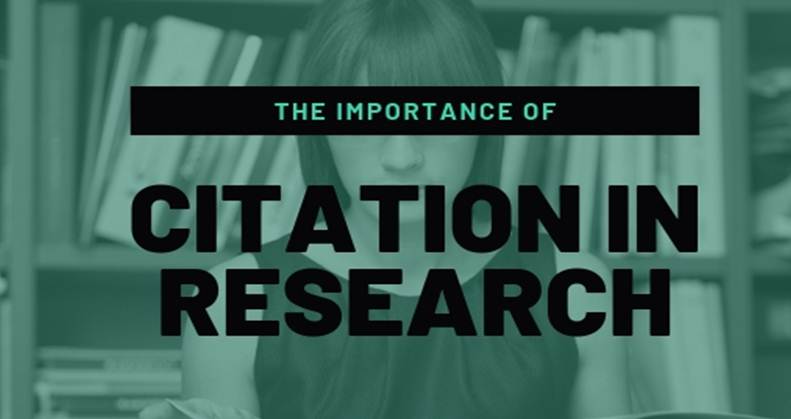
One of my articles which has accomplished numerous hits on my blog is http://drvidyahattangadi.com/why-bibliography-is-important-in-research/
Why citations are important in your research work?
The answer for this question is the fact that we are living in an information economy, in every research work of yours, your ability to allow readers quick access information is more important than the knowledge you present. Providing readers the ability to obtain the information is often more appreciated than the method through which it is obtained.
A citation is a way of giving credit to individuals for their creative and intellectual works that you utilized to support your research. It can also be used to locate particular source which helps in plummeting plagiarism. Citing or documenting the sources used in your research serves purposes such as
i) it allows you to gives due credit to the authors of the work or ideas which you incorporated into your paper
ii) it allows those who are reading your work to locate your sources
iii) in order to trace from where you got your ideas that you included in your paper.
It is ethical to cite your sources
Even if no one reads your article/paper/book but clicks the link they regard your honesty for showing appreciation and giving credit to the hard work of those who helped you out. Make it a practice to religiously cite your sources. You might feel that proper acknowledgement of sources might make you look dumb, yet, there are instances in Universities where PhD thesis have been turned down for the lack of inadequate and genuine citations. Please don’t be under wrong impression that your work goes unchecked by referees.
Non-citing the sources in your literature goes out to portray your academic dishonesty, and the potential snags of plagiarism. While accuracy is all important in any writing, the very act of looking up a reference for verification serves as an accuracy check.
Citation makes you a better researcher
Some of the hallmarks of good research include attention to detail and the ability to distinguish outlines and make coherent connections with your own thought process. Honest citation practice portrays your reading habits. It shows your patience in reading variety of literature available on a topic while it also necessitates you to add many details, such as correct page numbers, the spelling of author names, and of course, the accuracy of facts that you are presenting in your own article or your thesis. This habit helps you becoming a detail-oriented researcher. As for the ability to spot trends and patterns, preparing a good bibliography trains you for this task which is crucial in scientific analysis.
Citation practice make you a good writer
We all researchers aspire to write elegant papers in which the style is as persuasive as the content and good acknowledgment habits build a strong foundation towards that goal. Citing specific sources for the various facts that we present removes the intellectual laziness, ambiguous thinking, and of course slack writing. A good writer will always write matter which can be substituted with specific sources. And, when you cite sources appropriately, you leave no question in your readers’ minds regarding your point. Furthermore, by citing, you can easily use precise language.
It is important to note that in the Academic Ranking of World Universities also known as Shanghai Ranking the parameter of citations a university has acquired attracts 30% of overall score. It looks at the role of universities in dispersing new knowledge and ideas.
It examines research weight by capturing the number of times a university’s published work is cited by scholars globally. In 2014, Thomson Reuters examined more than 50 million citations to 6 million journal articles, published over five years. The data are drawn from the 12,000 academic journals indexed by Thomson Reuters’ Web of Science database and include all indexed journals published between 2007 and 2011. The citations help to show how much each university is contributing to the sum of human knowledge. It shows whose research has stood out, has been picked up and built on by other scholars and, most importantly, it has been shared around the global scholarly community to push further the boundaries of our collective understanding, irrespective of discipline.
Well-presented bibliography shows your scientific knowledge
A bibliography is the compilation of the various sources that you have read and cited in your own manuscript, dissertation, book, etc. Thus, an extensive bibliography is naturally a sign of extensively read and well-informed researcher. It shows your deeper insights on the topic. It also improves your credibility as a writer.
Citation enables better substantiation of your work
Any piece of academic writing gets examined several times over before it finally makes it into print or onto a website. Whether one is a peer reviewer, editor, or editorial assistant whose job is simply to track down sources in the bibliography and make sure that the citations are exact. This helps your paper easily to be passed through the multiple rounds of editing with negligible criticism.
I conclude my article with point on bibliography that it is the key element of a research/thesis which is used to judge the quality of the work done by the researcher. Therefore, use up-to-date citations and cite your references scientifically. Please do not ignore the quality of bibliography. It exhibits your critical thinking, it proves you have read and understood your sources, it establishes your work as a valid source and you as a competent researcher, and it situates your study and topic in a continuing professional conversation. And finally, your bibliography might stimulate other researchers to carry on further work on your chosen topic of research.













































